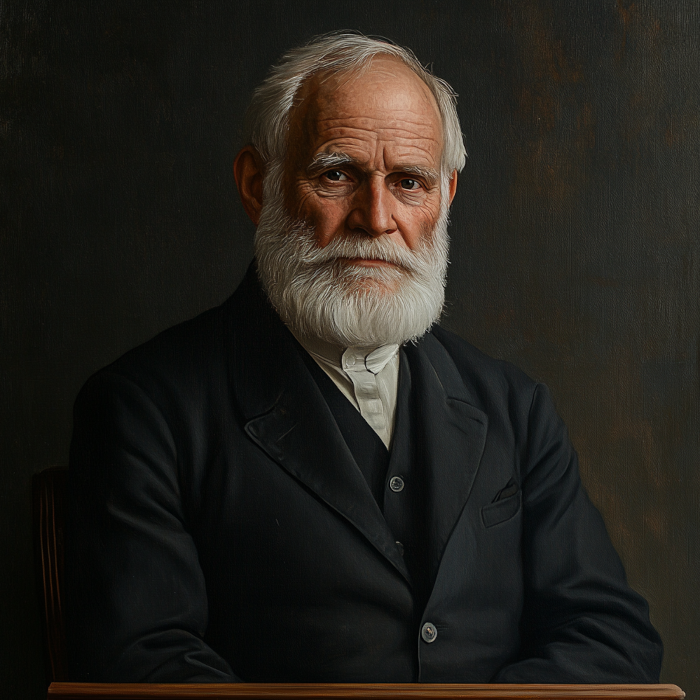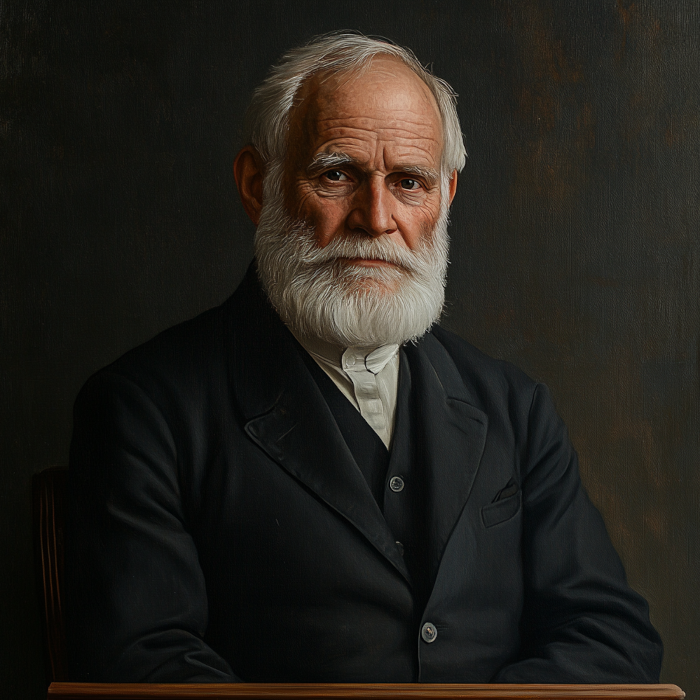


Ivan Petrovich Pavlov (1849–1936) was a Russian physiologist, best known for his pioneering research on classical conditioning. Pavlov's work on the conditioned reflex had a profound impact on the fields of psychology, neuroscience, and behavioral science. He is particularly famous for his experiments involving dogs, which demonstrated how animals (and humans) can learn to associate a neutral stimulus with a biologically significant one. Pavlov's contributions to understanding learning processes earned him the Nobel Prize in Physiology or Medicine in 1904, and his work laid the groundwork for later developments in behaviorism.
Birth and Family Background: Ivan Pavlov was born on September 14, 1849, in Ryazan, Russia. He was the eldest of ten children in a modest family. His father, Peter Dmitrievich Pavlov, was a village priest, and his mother, Varvara Ivanovna Uspenskaya, managed the household. Pavlov's early life was shaped by the religious environment of his family, which expected him to follow in his father's footsteps and join the clergy.
Education: Pavlov initially attended a church school and then enrolled in the Ryazan Ecclesiastical Seminary. However, his interest in science, particularly in physiology and natural science, grew stronger during his studies. In 1870, he left the seminary and enrolled at Saint Petersburg University, where he studied chemistry and physiology. Pavlov was deeply influenced by Russian scientists Dmitri Mendeleev and Ilya Mechnikov, as well as European physiologists. After completing his studies at the university, he attended the Imperial Military Medical Academy, where he specialized in physiology.
Career in Physiology: After completing his studies, Pavlov began his career as a physiologist and took up various research positions in Saint Petersburg. He worked under prominent figures such as Carl Ludwig and Heinrich Braun, gaining experience in experimental techniques. Pavlov's early research focused on the nervous regulation of the heart and the digestive system, areas that would lay the foundation for his later discoveries.
Director of the Department of Physiology: In 1890, Pavlov was appointed the head of the Department of Physiology at the Institute of Experimental Medicine in Saint Petersburg. During this time, he began his groundbreaking work on the digestive system of animals, particularly dogs. His research aimed to understand the complex physiological processes involved in digestion, focusing on the role of different glands and the nervous system.
The "Pavlov Pouch" Technique: To study the digestive process, Pavlov developed a surgical technique known as the "Pavlov pouch", which allowed him to collect gastric secretions from a dog’s stomach without causing harm to the animal. Using this technique, Pavlov made significant discoveries about the role of gastric juice and how its secretion was influenced by external stimuli. He found that the mere sight or smell of food could stimulate gastric secretion, even before the food reached the stomach.
Nobel Prize in Physiology or Medicine (1904): Pavlov’s detailed study of the digestive system led to the publication of his book, "The Work of the Digestive Glands", in 1897. This work earned him the Nobel Prize in Physiology or Medicine in 1904, making him the first Russian to receive the prize. His discoveries provided a deeper understanding of the physiological basis of the digestive process, significantly advancing medical science.
Accidental Discovery of Conditioning: Pavlov's most famous work came about as an accidental discovery during his research on digestion. He noticed that the dogs in his laboratory began to salivate not only when food was presented to them but also when they saw the lab assistant who fed them or heard the sound associated with feeding time. This observation led Pavlov to explore the psychic reflexes involved in such responses.
Classical Conditioning Experiments: Pavlov designed a series of experiments to understand this phenomenon. He paired a neutral stimulus (such as the sound of a bell) with an unconditioned stimulus (food) that naturally produced an unconditioned response (salivation). After repeated pairings, the dogs began to salivate at the sound of the bell alone, even without the presence of food. Pavlov termed this learned response a "conditioned reflex" and the process as "classical conditioning". The previously neutral stimulus (the bell) had become a conditioned stimulus capable of eliciting a conditioned response (salivation).
Fundamental Concepts of Classical Conditioning:
Impact on Psychology: Pavlov’s research demonstrated that behavior could be influenced by associative learning. His findings laid the groundwork for the field of behaviorism, which would become a dominant force in psychology in the early 20th century. Psychologists such as John B. Watson and B.F. Skinner were inspired by Pavlov’s work and used his principles to develop theories of behavioral conditioning and learning.
Extinction, Generalization, and Discrimination: Pavlov conducted extensive research into the processes of extinction, generalization, and discrimination in classical conditioning. He found that a conditioned response could gradually weaken and disappear if the conditioned stimulus was repeatedly presented without the unconditioned stimulus, a process known as extinction. He also discovered that similar stimuli could produce the same response (generalization), and that animals could learn to distinguish between different stimuli (discrimination).
Concept of Experimental Neurosis: Pavlov explored how animals reacted to increasingly difficult and ambiguous tasks, leading to a state he called experimental neurosis. He observed that when animals were presented with inconsistent stimuli, they exhibited signs of anxiety and stress, leading him to hypothesize about the potential impact of conditioning on mental health. His work in this area foreshadowed later research into the relationship between stress, conditioning, and psychopathology.
Conditioning and Human Behavior: Although Pavlov primarily conducted experiments with animals, he believed that the principles of classical conditioning could be applied to humans as well. He proposed that many human behaviors, including emotional responses, were shaped by learned associations. His research laid the foundation for later studies on phobias, anxiety, and habit formation, and influenced the development of behavioral therapy techniques that use conditioning principles to modify problematic behaviors.
Pavlov's Impact on Psychology: Pavlov's discoveries revolutionized the study of behavior and learning, providing scientific support for the behaviorist approach to psychology. His work influenced many notable psychologists, including John B. Watson, who used Pavlov’s findings to argue that behavior could be understood in terms of stimulus-response relationships, without reference to internal mental states. Pavlov’s research methods emphasized objectivity and rigor, setting new standards for psychological experimentation.
Behaviorism and Conditioning Theories: Pavlov’s research on conditioning had a profound impact on the development of behaviorism, a school of psychology that emphasizes the study of observable behavior. Behaviorists like B.F. Skinner expanded on Pavlov’s work by developing theories of operant conditioning, which focused on the role of reinforcement and punishment in shaping behavior. Pavlov’s emphasis on learning through association also contributed to the development of cognitive-behavioral therapy (CBT), one of the most widely used forms of psychotherapy today.
Medical and Therapeutic Applications: Pavlov’s insights into conditioned reflexes have had applications in a wide range of fields, including education, neuroscience, and behavioral therapy. His work has been used to develop treatment methods for conditions such as phobias and addictions, employing techniques that involve desensitization and counter-conditioning to help individuals unlearn maladaptive behaviors.
Recognition and Influence in Soviet Russia: Pavlov remained a respected figure in the Soviet Union throughout his life. Despite being critical of Bolshevik policies in the early years of the Soviet regime, he was able to continue his research, largely due to his international reputation and the scientific value of his work. He was provided with funding and a laboratory by the Soviet government, and his research continued uninterrupted. Pavlov used his influence to advocate for scientific freedom and the importance of objective research, even during periods of political turmoil.
Death: Ivan Pavlov died on February 27, 1936, in Leningrad (now Saint Petersburg), at the age of 86. He was actively working on his research until the end of his life, and his contributions to science have continued to influence the study of psychology and behavior long after his death.
Pioneer of Classical Conditioning: Ivan Pavlov’s work on classical conditioning remains one of the most significant contributions to behavioral science. The concept of conditioned reflexes has become a fundamental principle in the study of learning and behavior. Pavlov’s research provided a clear and replicable model for studying the mechanisms of learning, emphasizing the importance of observable behavior and establishing the stimulus-response model as a key component of psychological science.
Influence on Modern Psychology: Pavlov’s influence extended far beyond physiology to transform the field of psychology. His research inspired the development of behaviorism and had a major impact on fields such as cognitive-behavioral therapy, education, and neuroscience. His emphasis on empirical, objective experimentation set a standard for scientific inquiry in psychology, emphasizing the importance of reproducible and measurable results.
Inspiration for Later Researchers: Pavlov’s work inspired a generation of scientists to explore the biological basis of behavior and the role of learning in shaping both animal and human responses. His research methods were adopted and refined by later psychologists, and his findings provided a framework for studying complex behaviors in a systematic way. His influence can be seen in the work of figures such as B.F. Skinner, John B. Watson, and Albert Bandura, who all built upon Pavlovian principles to develop their own theories of learning and behavior.
Ivan Pavlov was a groundbreaking scientist whose research into classical conditioning fundamentally transformed our understanding of behavior and learning. His experiments with dogs revealed the mechanisms by which associations are formed, leading to conditioned reflexes—a concept that became central to behavioral psychology. Pavlov’s contributions went beyond physiology, influencing multiple fields including psychology, education, and medicine.
Pavlov’s legacy endures not only in his contributions to science but also in the methods he developed for studying behavior. His commitment to empirical research and the development of objective techniques for studying complex phenomena helped establish a foundation for modern psychological research. The principles of classical conditioning continue to be applied in diverse areas, ranging from therapeutic interventions to educational strategies, demonstrating the lasting impact of Pavlov’s work on the scientific understanding of learning and behavior.

We use cookies
We use cookies and other tracking technologies to improve your browsing experience on our website, to show you personalized content and targeted ads, to analyze our website traffic, and to understand where our visitors are coming from. Privacy Policy.